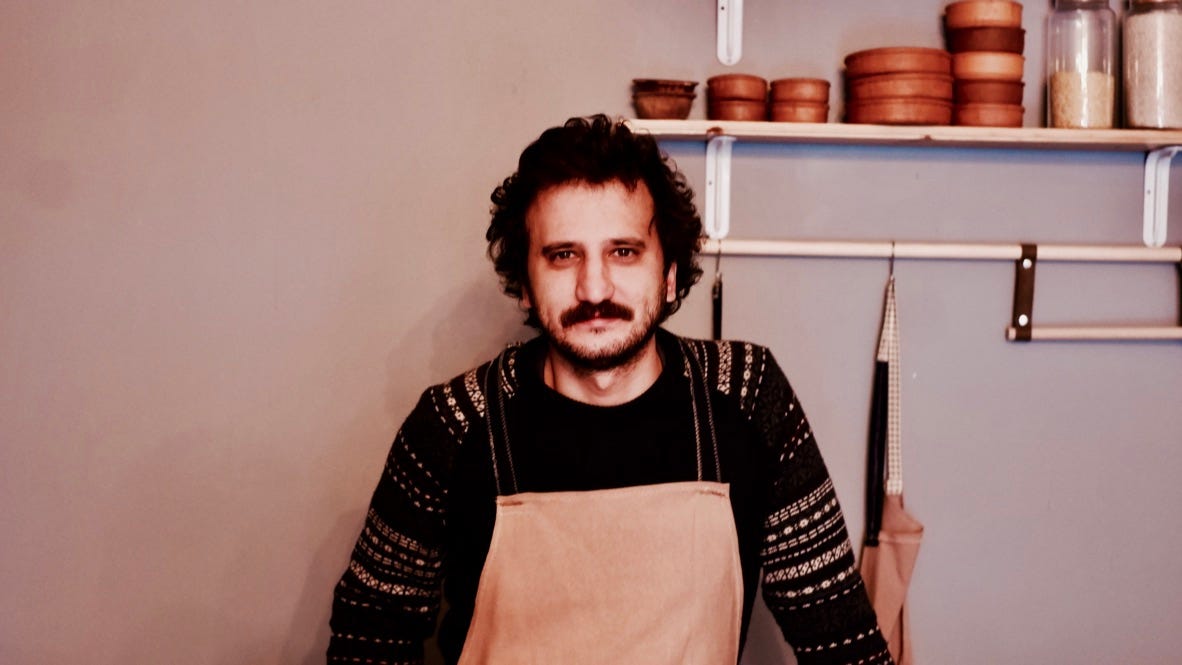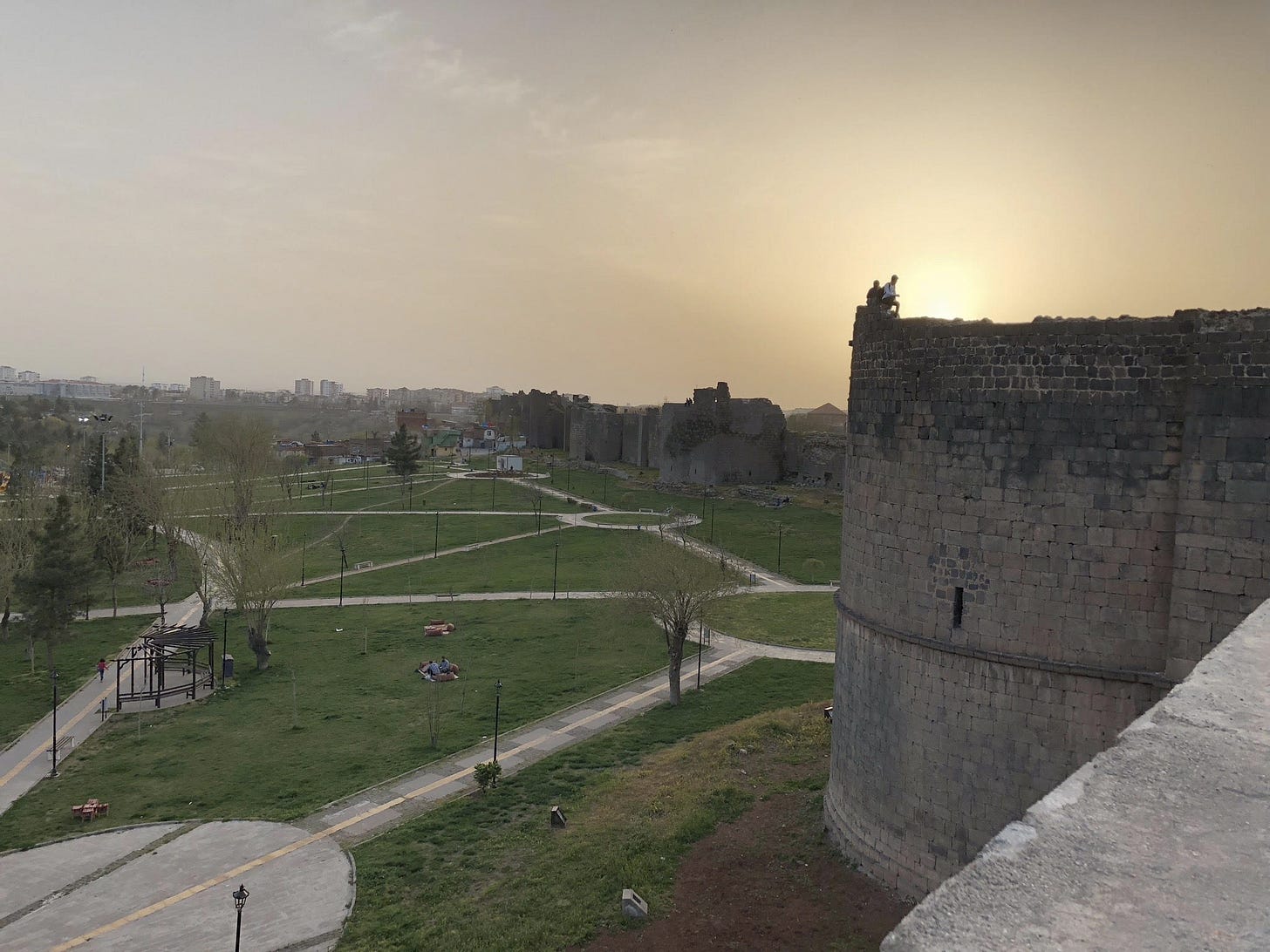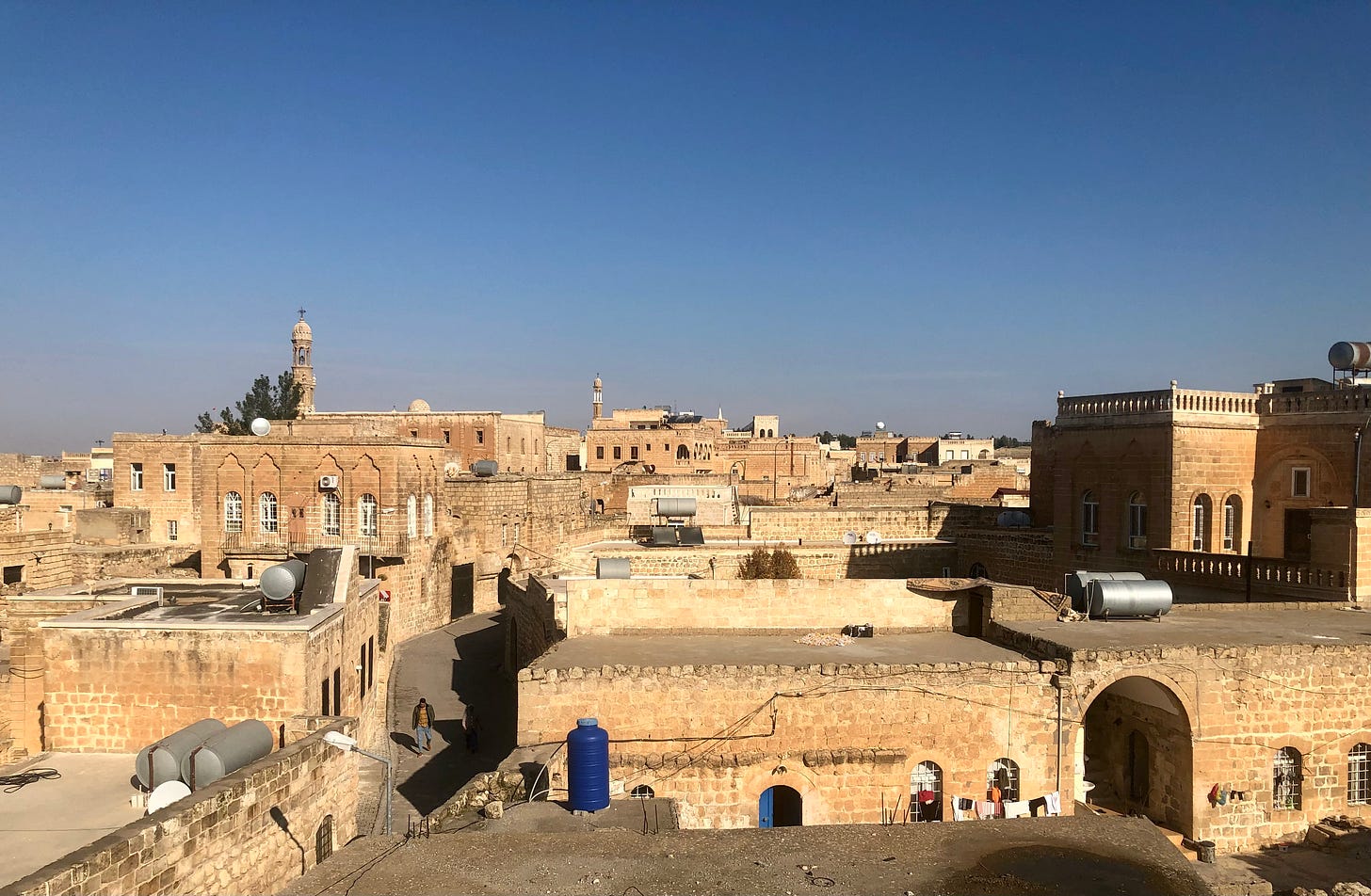Vines, Water, Soil, History: The boutique winemakers of Diyarbakır and Mardin
In Turkey's southeast, a small but resolute number of wine producers are churning out excellent wines from endemic grapes against all odds.
Turkey's southeastern city of Diyarbakır is nestled in a swath of fertile land. The Tigris River snakes around the east of the city and flows under the 11th-century Ten Arches Bridge to the south. The Sur district, the historic heart of Diyarbakır, is encircled by imposing basalt defensive walls.
Diyarbakır was among the 10 provinces in southern and southeastern Turkey that were hit by a pair of earthquakes on February 6 that amounted to the deadliest disaster in the history of the modern republic. The death toll in the quakes reached 50,000, with some cities in the region experiencing utter devastation. Diyarbakır was comparatively better off, though numerous buildings collapsed and at least 407 people died. In the aftermath of the tremors, a huge segment of the city’s population fled for rural areas in fear of aftershocks.
On the southern edge of Sur just inside the walls on a busy street in the district lies what was initially dubbed Yek Boçik, an unassuming but smartly decorated four-table restaurant, with plain wooden furniture, ceramic cookware, and elegant handmade light fixtures. Its sole proprietor, chef and front of the house is Serdil Demir, a computer engineer by trade in his 30's whose extensive travels abroad and deep connection to the ingredients and recipes of his homeland inspired him to open up this Kurdish-Mexican fusion joint in 2021. Most recently Demir changed the name of his restaurant to Ameditane, a reservation-only concept involving a more expansive menu.
As his flagship dish, Serdil serves up delectable braised oxtail tacos in handmade bulgur-wheat tortillas, which have a slight orange tinge from the addition of pepper paste, and are topped with pico de gallo and spicy, pickled peppers. But he has another specialty, though it is not sold at his restaurant. Serdil and his cousin Serkan, Kurds from the neighboring province of Mardin, have been making wine with an experimental approach for the past five years, tinkering with obscure varieties of grape amid conditions that could be described as, at best, highly adverse. The name of their fledgling winery, Tor, is Kurdish for their ancestral homeland in Mardin.
Climate change has generally not been kind to producers across Turkey, where a full-blown advertising ban on alcohol has been in place for nearly a decade, making it difficult for wineries to promote themselves and even prohibits them from holding tastings at their establishments. If that wasn't enough, the government twice a year imposes tax hikes on alcoholic beverages, which now amount to the vast majority of the price of a bottle, and has made drinking a luxury in a country that is in the middle of an economic crisis, where purchasing power has disintegrated, and inflation has tipped over three digits.
Unlike Georgia, which successfully marketed its high-quality wine and transformed the country into a tourist destination within the past decade, Turkey went in the other direction, even though this country's wine could compete with its neighbors. Greece has experienced a revival in its winemaking over the past two decades, while Armenia and Georgia, considered the ancestral birthplaces of wine production, have ramped up marketing of their products abroad to no small success.
For its part, despite the extensive setbacks, Turkey’s boutique wine sector has actually flourished and grown immensely in recent years, with stubborn producers churning out fantastic wines in defiance of the difficult circumstances. In fact, between 2004-2021, the number of licensed winemakers in Turkey more than tripled.
For the moment they remain small-scale and unable to sell their bottles (which don't have labels) but the Demir cousins have managed to produce a number of varietals from the grapes that are endemic to this part of the country, some of which have never previously been sold on the shelves.
After business hours, Serdil and I sit down and he opens a bottle of his Boğazkere, one of Turkey’s flagship grapes. This batch in particular came from the nearby district of Dicle. Translating to “throat burner” in Turkish, the heavy-bodied, intense Boğazkere is often mixed with Öküzgözü, a more subtle and widely-consumed grape. The blend is one of the most common bottles seen throughout Turkey. But Serdil's pure Boğazkere does not scorch the throat. On the contrary, this red is sweet and elegant, with prominent notes of pekmez, a type of molasses that is a staple in Turkey. The buzz kicks in after a few glasses as it registers at a high 15-16 percent alcohol.
Between glasses, Serdil brings out some dishes that he has been working on. The first is a deconstructed Neapolitan pizza, with slices of fresh flatbread, blissfully sour tomatoes, local Mozzarella cheese and sprigs of purple basil.
“Rather than a copycat who is trying to be the best of his kind, I am trying to learn our own story. I feel that I belong to a geography where grapes are extracted from the soil from the beginning of June until the middle of December. There are 18 varieties of grapes in my village alone,” Serdil says.
“Every year I try 2-3 kinds of grapes from my own village. While trying to produce vinegar or wine from grapes, I learn more about the seasons, climate and geography. Researching the past leads to a better understanding of change,” he adds.
I first met Serdil at his restaurant at the tale end of 2021 and tried his wines, which included a gorgeous light-purple hued rosé made from Öküzgözü and Boğazkere that featured curious notes of black pepper. It was like no other rosé I had tried, likely owing to the combination of grapes that is traditionally used in red wines. Up next, Serdil pours an Antep Karası, a grape sourced from the southeastern provinces of Adıyaman and Maraş. This endemic grape is consumed as a fruit and has been most certainly used to make wine at some point over the years, but it has never been commercially sold. It is softer on the palate than the Boğazkere yet equally welcoming, and pairs well with a delicious grilled chicken taco laced in spicy sauce that Serdil brings out of his kitchen.
The two bottles go quickly, and Serdil and I head over across Diyarbakır's main square to huddle in the back room of a tiny liquor store and drink one too many cheap beers with some friendly strangers. It wasn't a good idea after the heady wine, and I woke up beyond hungover. It was a sunny December day, alarmingly warm for the time of year, so I decided to sweat it out with a walk to the Ten Arches Bridge, passing through the walls and the vast Hevsel Gardens, urban farms that have been cultivated since the ninth century BC using water from the adjacent Tigris River.
Prior to the earthquakes, Diyarbakır already had its share of problems, as it was reeling from the economic crisis and high double-digit inflation that has nearly brought the country to its heels. Dozens of elected mayors from the pro-Kurdish Peoples’ Democratic Party (HDP) were replaced by government-appointed officials in 2019, and Diyarbakır’s mayor was no exception. Supporters of the HDP believe that it is part of a wider attempt by President Recep Tayyip Erdoğan and the ruling Justice and Development Party (AKP) to destroy the party. The HDP has been a fierce challenge to Erdoğan’s rule for the better part of the past decade, and its co-leaders have been held behind bars on politically-motivated charges for six years.
In 2015, an ongoing peace process between the banned Kurdistan Workers' Party (PKK) and the Turkish security forces went up in flames, and conflict broke out in several districts in the southeast. One of these was Diyarbakır's ancient heart of Sur, a massive section of which was flattened to the ground. This area is just a few minutes' walk from Serdil's restaurant. The construction of new buildings with a vaguely basalt tone meant to resemble Sur's historic homes is near completion, and numerous cafes and stores have already opened up, but the new development is a stark contrast to the slender, maze-like streets and historic wealth that characterizes the rest of Sur.
Among the iconic sites in the area spared from the violence was Sülüklü Han, a 17th-century-built caravanserai in Sur.. The Sülüklü Han Collective has been producing its own wine for years, serving a glass of red made with flagship grapes from the province of Elazığ alongside a triangular wedge of sharp white cheese at prices unheard of pretty much anywhere else in the country. The collective aims to keep prices as low as possible. The atmosphere in the tree-blanketed courtyard is serene and many of its patrons are non-drinkers, preferring coffee or tea but not having a problem being next to a table with those imbibing.
In March, Serdil told me that for a week or two after the earthquakes, much of the city left for their home villages, but things were soon back to normal. Due to the rather obscure nature of his restaurant, business has been persistently slow but he has nevertheless hired another employee.
At the beginning of last year, Diyarbakır hosted a tasting event featuring 8 local producers including Tor which was attended by more than 50 people. It was a small but encouraging step for a region not as well known for wine in Turkey, in comparison to Central Anatolia, the Aegean and Thrace. In southeastern Turkey however, one name generally comes to mind: the Syriacs.
Also known as Assyrians or Arameans, Syriacs are native to the region, specifically the Midyat district of Mardin to Diyarbakır's south. They are Christians who speak a mother tongue that is the closest living language to the Aramaic spoken by Jesus Christ. The largest producer of Syrian wines, Shiluh, is widely available in Istanbul, but to find the smaller wineries, one must go to the source.
Midyat was once inhabited by a majority of Syriacs, but they found themselves caught in the middle of a conflict they had no stake in, the protracted battles between the PKK and the Turkish armed forces that began in the 1980s and stretched well into the 1990s. Tens of thousands of Syriacs fled, settling in Istanbul or heading for Europe. Now just a few thousand remain in the area, but their visual impact is strong in the old city of Midyat, with its maze of ancient beige stone houses and numerous churches.
It took just over three hours to get from Diyarbakır from Midyat via two minibuses. There was the requisite gendarmerie checkpoint where a soldier walks in and checks everyone's identification, an inescapable inconvenience in this part of the country owing to the years-long conflict. I eventually arrived, had dinner, and ambled over to Sahra, a small shop in the heart of old Midyat that sells a variety of Syriac wines. Its owner is 33-year-old Aho Çınar, who is among the remaining Syriacs of Midyat.
“This is our culture. As far as I can remember from when I was a child, my family made wine. I loved the winemaking, and the vine-harvesting seasons. When I first got on my feet and walked, I started going to the vines, and I have been within wine ever since,” Çınar said. Then the tasting begins. We start with a wine called Baluto made by the winery Midin from Karkuş grapes sourced in the province of Şırnak. Technically it is a white wine, but it has a seductive amber hue. It is sublimely full-bodied and sweet with notes of vanilla.
Aho also makes his own wines, and we try several. All are excellent, particularly a red made with a local grape called Sabbak mixed with Öküzgözü that managed to be soft and cozy yet leathery and oaky at the same time, like sitting in front of a warm fire while sipping a fine scotch.
According to Çınar, the conflict in the southeast and the ensuing flight of Syriacs resulted in a lost generation for winemaking in the region, but he intends on preserving his family trade:
“We live in the southeast. Here and in Iraq and Syria there has always been unrest. Wine culture can't develop here because it is a culture of delight. One generation drifted away from wine. With my family, I am among those returning to wine and trying to rejuvenate wine culture,” Çınar said.
The affable Çınar pours sample after sample of wine, and we talk well into the evening. The next morning, I traveled to Nusaybin, which flanks the border with Syria and is home to a population of 100,000, including Serdil's cousin Serkan. The city is brimming with energy common to border cities; the slightly-larger Syrian city of Qamışlı is located immediately across the border, heavily fortified with guard posts and razor wire. In 2015, Nusaybin was among the Kurdish-majority districts that burst out in violence when the peace process fell apart, and several neighborhoods in the upper end of the city were destroyed during the fighting. Armored vehicles still routinely patrol the elegant main square, which feels intimidating and unnecessary. The downtown, however, is bustling, and an ancient Syriac church sits side by side with a mosque just a stone's throw from the border fence.
Though Nusaybin and Qamishlı find themselves separated from one another by closed international borders, both cities are majority Kurdish and share relatives. The comparatively calm Nusaybin, however, is in close proximity to ongoing turmoil in northeastern Syria, much of which is controlled by the Kurdish-led Syrian Democratic Forces and its armed wing, the People’s Defense Units (YPG). The Turkish government sees the latter as the PKK’s Syrian affiliate and has engaged in multiple military operations in recent years resulting in seizing of strategic land from the Kurdish forces and the installation of Turkish military occupation. Control of Qamishlı is uneasily shared between the SDF and the Syrian regime, though government forces and an ally of the YPG have battled over the city as recently as 2021.
Serkan Demir grew up in a conservative household where wine was not to be found on the shelves. He first tried it in Istanbul when he was 13 when his more progressive uncle, who was living in Russia, brought some to Turkey and poured it into a tea glass for Serkan to have a taste. That first sparked his interest, and after studying Mathematics as an undergrad, he applied to a two-year Wine Production Technology program, which he completed in 2016 in the city of Adana. At the time, there were a small handful of such programs still offered at public universities in Turkey, but they have since all been eliminated as a result of lack of demand in addition to an increasingly conservative, repressive environment in state universities.
Serkan waited for Serdil to return from Latin America, and the pair began to make wine in 2017, indulging their fascination for endemic regional grapes.
“In this geography, there isn't the collective memory to the extent that there is in the west, things aren't written down. I wonder if these local grapes were really only used on the table or for raisins, or for grape juice? Were they never used for wine? There is not an answer for this in the literature, it's unknown,” Serkan explains. It is this reason why he finds it important to experiment and record the results.
Though climate change has undoubtedly been a disaster for agriculture in Turkey, a historically fertile country known for excellent produce, Serkan has a more nuanced view on the issue. He believes that in recent years climate change has affected some types of grapes positively while others negatively, noting that wine is something that is always changing all the time anyway.
The next day I take a minibus to the provincial capital of Mardin, then hop on a plane back to Istanbul. The monumental walls of Diyarbakır, the ancient sandy-hued churches of Midyat, the windy mountainous journey to Nusaybin and the Turkish-Syrian border flickers through my mind, as does the destruction and unfortunate rebuilding of Sur, the constant police and military presence, the persistent underdevelopment of much of the region, and of course the seemingly impossible task of its boutique winemakers.
For people like the Demir cousins and Çınar, wine is so much more than a drink, a hobby or a business. It is their culture, their soil, their past and their future, and they have gone to great lengths to maintain, preserve and make new discoveries so that legacy won't fade. They have persisted against all odds, and time will tell if conditions will render their craft impossible, or if Turkey will change its course and embrace its vines like its neighbors have done so thoroughly.
Note: This article was supposed to be published by another outlet in 2023, but was cancelled due to the devastating earthquakes. It was beautifully translated to Turkish by Reyhan Ülker for Apero in February of this year.










